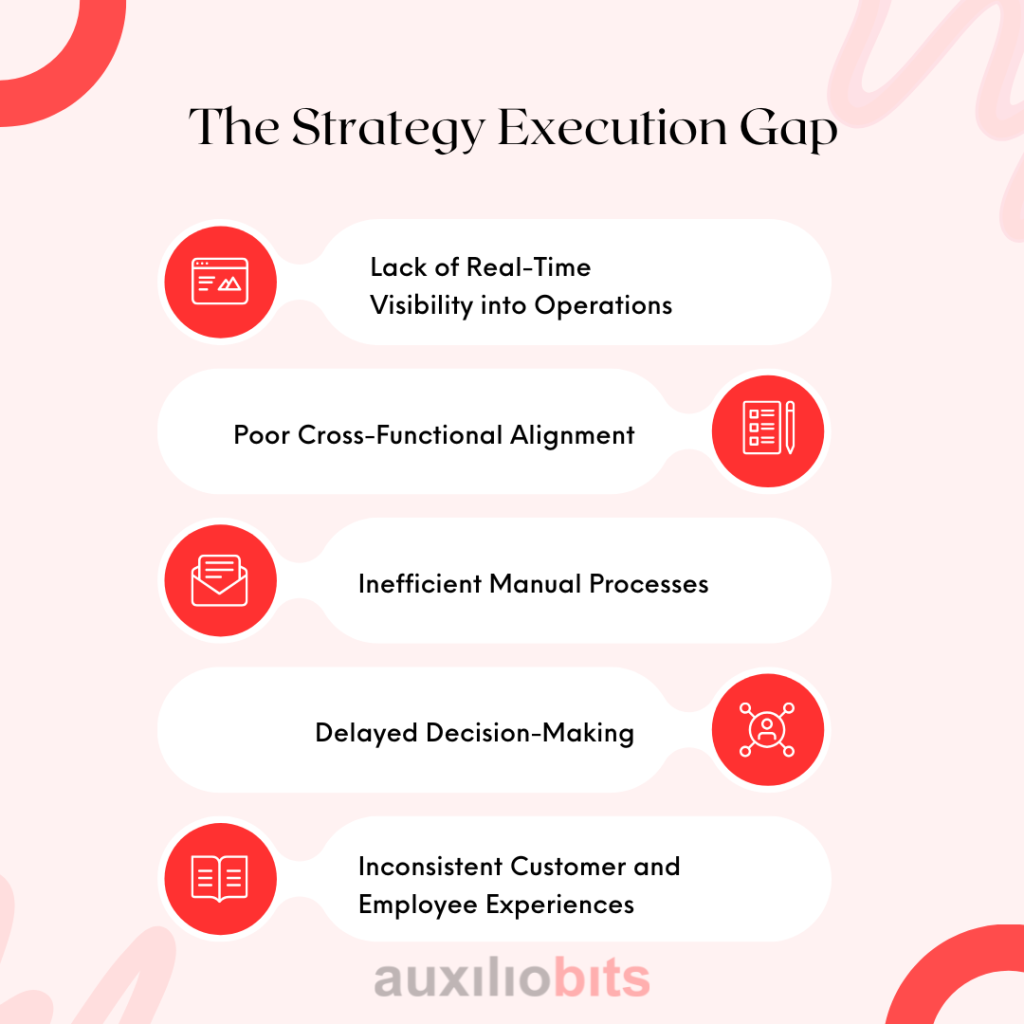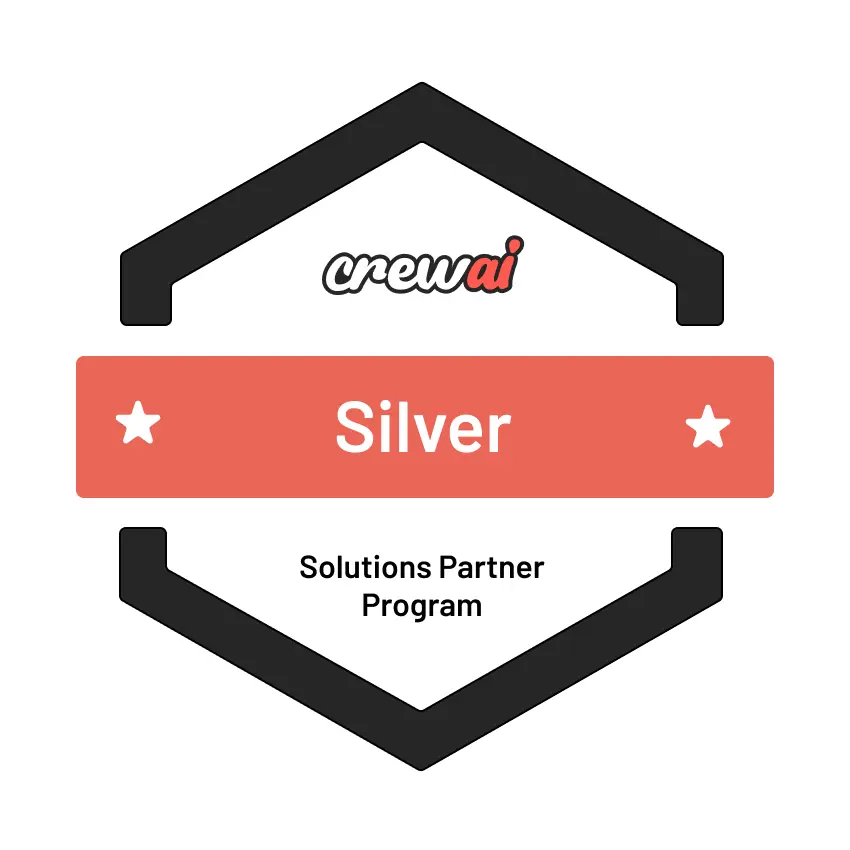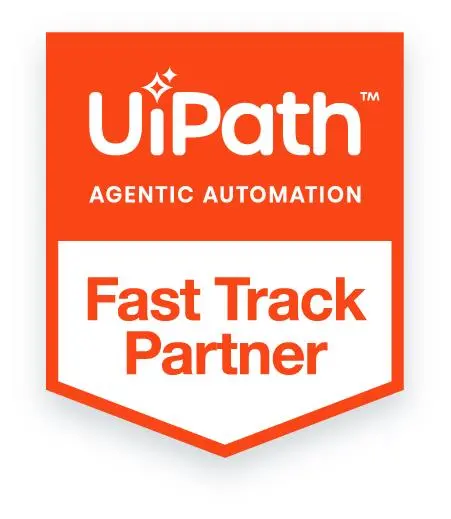
Key Takeaways
- AI agents close the strategy-execution gap by automating tasks and enabling real-time, data-driven decisions across business operations.
- They enhance agility by adapting quickly to market shifts, customer behavior, and internal changes to keep strategies on track.
- AI agents continuously monitor KPIs, identify performance issues, and take corrective actions to maintain strategic alignment.
- By automating repetitive tasks, AI agents boost efficiency, reduce errors, and free employees for higher-value strategic work.
- AI agents improve customer and employee experiences through personalized, responsive support, driving satisfaction and business growth.
We live in a world where companies face numerous challenges when turning their big ideas into tangible outcomes. Even though they set clear goals, the real challenge is to ensure that every activity, project, and task fulfills the requirements. Many firms find themselves in a confused state of mind when strategizing what needs to be done. Therefore, there is always a gap between the strategy and execution that can often lead to bad performance, poor results, and missed opportunities. Hence, AI agents can work magic for you if you are among such companies. They are innovative, work independently, and are powered by artificial intelligence. Not only this, but they can take action immediately and consider real-time data to make swift decisions. What else do you need? All of this is possible without asking for any human involvement.
AI agents also have the capability to monitor the progress of different projects. They have the best skills to monitor risks, make recommendations, and assign tasks to other systems. This way, all the tracks align with the company’s requirements, and AI agents allow them to gain success quickly. Also, AI agents allow firms to lessen human errors, which is why they are a suitable solution. In addition, while AI agents are operating, employees can prioritize other tasks and make sure everything is complete.
At the core of AI agents are several key technologies:
1. Natural Language Processing
This allows AI agents to understand and interact with humans using natural language through text or voice. NLP helps agents comprehend instructions, process data, and engage in meaningful conversations.
2. Machine Learning
ML enables AI agents to learn from data patterns and experiences. Over time, the agents improve their decision-making by recognizing trends and making smarter predictions.
3. Robotic Process Automation
AI agents can perform repetitive tasks typically handled by humans, such as data entry, report generation, or routine customer service queries, but with incredible speed and accuracy.
4. Large Language Models
LLMs help AI agents process vast amounts of textual data, enabling them to generate human-like responses, summarize information, and provide context-aware insights.
5. Decision Intelligence
This technology helps AI agents make strategic decisions by considering short-term and long-term impacts, optimizing business outcomes, and aligning with organizational goals.
6. Predictive Analytics
AI agents use predictive models to forecast future trends and outcomes, enabling businesses to plan more effectively and proactively address potential challenges.
These technologies empower AI agents to handle complex workflows, adapt to changing conditions, and provide valuable recommendations. By integrating intelligence and context awareness, AI agents enhance business operations beyond basic automation to drive innovation and efficiency.
Also read: How Agentic AI is Enabling 24/7 Autonomous Customer Support in E-Commerce?
The Strategy Execution Gap
Despite having firm strategic plans, many organizations face significant challenges regarding execution. These difficulties often result in a gap between what businesses envision and what they can achieve. Several factors contribute to this strategy execution gap:

1. Lack of Real-Time Visibility into Operations
Without real-time insights into daily operations, businesses struggle to track progress, identify bottlenecks, and promptly adjust. Executives and managers often work with outdated data or incomplete information, leading to suboptimal decisions.
2. Poor Cross-Functional Alignment
Large organizations typically involve multiple departments, each with goals and priorities. This can result in misalignment, where teams may not be fully aware of how their actions contribute to the company’s broader strategy. When different functions are working in silos, collaboration becomes challenging, and the overall strategic plan can falter.
3. Inefficient Manual Processes
Many businesses still rely on manual processes like data entry, reporting, and communications. These processes are time-consuming, prone to error, and often slow down strategy execution. When teams are bogged down with repetitive tasks, their ability to focus on high-level strategy execution diminishes.
4. Delayed Decision-Making
Effective execution requires timely decisions. However, without the right tools or systems in place, decision-making can be delayed due to information silos, lack of insights, or slow feedback loops. Delayed decisions hinder the organization’s ability to respond quickly to changes and adjust course when needed.
5. Inconsistent Customer and Employee Experiences
When strategy is not executed effectively, customer and employee experiences can suffer. For customers, inconsistent service quality or slow response times can tarnish brand reputation. Similarly, employees may feel disengaged if they don’t see their work directly contributing to organizational goals or if their workflows are inefficient.
AI agents can play a crucial role in overcoming these challenges. AI agents act as digital assistants, orchestrators, or autonomous operators, bridging the gap between planning and execution. They bring real-time visibility into operations, allowing organizations to monitor progress and make data-driven decisions. AI agents can help align cross-functional teams by automating communication and ensuring everyone is on the same page.
How do AI Agents Enhance Strategy Execution?
AI agents are transforming how organizations execute their strategies by automating key tasks, providing data-driven insights, and enabling agility across industries. Let’s explore how AI agents enhance strategy execution and help businesses stay competitive.
1. Accelerating Decision-Making with Data Insights
AI agents excel at processing large volumes of structured and unstructured data from diverse sources, delivering real-time insights and actionable recommendations. AI agents provide strategic guidance that supports faster decision-making by analyzing customer behaviors, market trends, and competitor data.
Example: In a sales organization, an AI agent can monitor customer purchasing patterns, competitor pricing strategies, and market shifts. Based on this analysis, it can recommend the optimal price point or identify upselling opportunities that align with the organization’s revenue goals.
Benefit: By offering timely, data-backed insights, AI agents ensure faster, more informed decision-making aligned with the organization’s strategic objectives. This accelerates execution and ensures that business goals are met.
2. Operationalizing KPIs
Key Performance Indicators (KPIs) are critical for monitoring strategy execution. AI agents help businesses stay on track by continuously monitoring KPIs in real time, identifying deviations from expected performance, and taking corrective actions where needed.
Example: In manufacturing, AI agents can monitor metrics like production throughput, defect rates, or equipment performance. If a significant deviation from the target occurs, the agent can recommend corrective actions, like initiating maintenance or recalibration, or automatically trigger these actions.
Benefit: This real-time monitoring and proactive intervention help ensure that the execution of strategic initiatives stays on course, preventing performance issues from undermining goals and objectives.
3. Enhancing Agility and Responsiveness
Adaptability is key in today’s volatile business environments. AI agents enhance organizational agility by identifying shifts in the market, customer behavior, or internal operations and quickly adapting processes to stay aligned with changing conditions.
Example: In e-commerce, if an AI agent detects a sudden surge in demand for a particular product, it can automatically adjust inventory levels, reorder stock, and update marketing campaigns to capitalize on this demand.
Benefit: AI agents enable organizations to pivot quickly in response to market fluctuations, ensuring that strategies remain practical and relevant in dynamic environments.
4. Automating Repetitive Yet Critical Tasks
AI agents effectively automate repetitive tasks essential to business operations but do not require human creativity or decision-making. This automation reduces the burden on employees and ensures consistency and efficiency in executing key functions.
Example: In HR, AI agents can manage end-to-end processes such as employee onboarding, tracking compliance, and responding to routine employee queries. By handling these tasks autonomously, the agents free up HR professionals to focus on more strategic initiatives.
Benefit: This automation streamlines operations, enhances efficiency, and enables employees to dedicate their time and energy to high-impact tasks, which drives overall strategic execution.
5. Orchestrating End-to-End Processes
Many strategic initiatives require coordination across departments, systems, and workflows. AI agents act as orchestrators, ensuring smooth integration and communication between different functions, reducing silos and improving overall operational efficiency.
Example: In a financial services firm, an AI agent could manage the entire loan processing pipeline—from verifying client data and assessing risk to generating documents and notifying stakeholders.
Benefit: By automating the orchestration of cross-functional workflows, AI agents reduce the need for manual handoffs, minimize errors, and ensure faster and more efficient execution of strategic initiatives.
6. Improving Customer and Employee Experience
Customer and employee satisfaction are integral to any organization’s success. AI agents enhance these experiences by offering personalized services, promptly addressing queries, and ensuring consistency across touchpoints.
Example: Conversational AI agents, such as chatbots, can provide 24/7 customer service, handling everything from product inquiries to troubleshooting. Similarly, AI agents can assist employees with internal queries related to HR policies or IT support.
Benefit: AI agents improve engagement and satisfaction by delivering tailored, instant responses. This boosts customer and employee loyalty and contributes to long-term business growth.
7. Driving Continuous Improvement
AI agents are capable of learning from historical data and real-time outcomes. This ability to learn and adapt allows them to continuously refine business processes, identify areas of improvement, and suggest new strategies for optimizing operations.
Example: In logistics, AI agents analyze shipping data to identify delays, suggest optimal delivery routes, or forecast potential disruptions. This helps the company adjust its operations to minimize inefficiencies and improve service delivery.
Benefit: AI agents facilitate a culture of continuous improvement, enabling businesses to fine-tune their strategies and operations iteratively. This ongoing refinement contributes to sustained competitive advantage and operational excellence.
Conclusion
AI agents are no longer just a thing of the future—they’re already changing how businesses get things done. They help companies work faster, make smarter decisions, and improve over time.
Businesses that start using AI agents now will have a significant advantage. They’ll be able to move ahead of the competition, offer better customer experiences, and adapt more easily to change.
If your business still relies on manual work to carry out its strategy, it is time to explore what AI agents can do. The future of business execution is intelligent, automated, and driven by AI—and it’s already happening.








